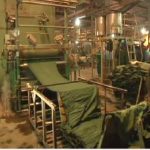The agriculture authorities is joining forces with foreign tractor manufacturers to enable indigenous production of tractors in the country.
The move is expected to help bridge the country’s agricultural mechanisation gap which has grossly affected output in the sector.
Mechanisation aids improved farm productivity, while boosting incomes of farmers and processors.
The International Food Policy research Institute, has it that studies on agricultural mechanisation on the continent have shown Nigeria has low machinery growth compared with other African nations.
Scarce machinery, purchasing power of farmers as well as inadequate access to credits, poor infrastructure and agricultural policies and the illiteracy of many subsistence farmers have limited the growth of agriculture mechanisation in the country.
The agriculture authorities are now trying to change this narrative through partnerships.
This pact is against the backdrop of the agriculture authorities’ target of facilitating the indigenous production of 2,000 tractors annually and in alignment with existing suggestions on how the country can boost agricultural mechanisation.
They include collaborations , adequate funding, increased investment and improved storages facilities amongst others.
Expected deliverables from enhanced agriculture mechanisation consist of good sufficiency, more foreign exchange earnings , as well as better processing and packaging.
The agriculture authorities is joining forces with foreign tractor manufacturers to enable indigenous production of tractors in the country.
The move is expected to help bridge the country’s agricultural mechanisation gap which has grossly affected output in the sector.
Mechanisation aids improved farm productivity, while boosting incomes of farmers and processors.
The International Food Policy research Institute, has it that studies on agricultural mechanisation on the continent have shown Nigeria has low machinery growth compared with other African nations.
Scarce machinery, purchasing power of farmers as well as inadequate access to credits, poor infrastructure and agricultural policies and the illiteracy of many subsistence farmers have limited the growth of agriculture mechanisation in the country.
The agriculture authorities are now trying to change this narrative through partnerships.
This pact is against the backdrop of the agriculture authorities’ target of facilitating the indigenous production of 2,000 tractors annually and in alignment with existing suggestions on how the country can boost agricultural mechanisation.
They include collaborations , adequate funding, increased investment and improved storages facilities amongst others.
Expected deliverables from enhanced agriculture mechanisation consist of good sufficiency, more foreign exchange earnings , as well as better processing and packaging.
The agriculture authorities is joining forces with foreign tractor manufacturers to enable indigenous production of tractors in the country.
The move is expected to help bridge the country’s agricultural mechanisation gap which has grossly affected output in the sector.
Mechanisation aids improved farm productivity, while boosting incomes of farmers and processors.
The International Food Policy research Institute, has it that studies on agricultural mechanisation on the continent have shown Nigeria has low machinery growth compared with other African nations.
Scarce machinery, purchasing power of farmers as well as inadequate access to credits, poor infrastructure and agricultural policies and the illiteracy of many subsistence farmers have limited the growth of agriculture mechanisation in the country.
The agriculture authorities are now trying to change this narrative through partnerships.
This pact is against the backdrop of the agriculture authorities’ target of facilitating the indigenous production of 2,000 tractors annually and in alignment with existing suggestions on how the country can boost agricultural mechanisation.
They include collaborations , adequate funding, increased investment and improved storages facilities amongst others.
Expected deliverables from enhanced agriculture mechanisation consist of good sufficiency, more foreign exchange earnings , as well as better processing and packaging.
The agriculture authorities is joining forces with foreign tractor manufacturers to enable indigenous production of tractors in the country.
The move is expected to help bridge the country’s agricultural mechanisation gap which has grossly affected output in the sector.
Mechanisation aids improved farm productivity, while boosting incomes of farmers and processors.
The International Food Policy research Institute, has it that studies on agricultural mechanisation on the continent have shown Nigeria has low machinery growth compared with other African nations.
Scarce machinery, purchasing power of farmers as well as inadequate access to credits, poor infrastructure and agricultural policies and the illiteracy of many subsistence farmers have limited the growth of agriculture mechanisation in the country.
The agriculture authorities are now trying to change this narrative through partnerships.
This pact is against the backdrop of the agriculture authorities’ target of facilitating the indigenous production of 2,000 tractors annually and in alignment with existing suggestions on how the country can boost agricultural mechanisation.
They include collaborations , adequate funding, increased investment and improved storages facilities amongst others.
Expected deliverables from enhanced agriculture mechanisation consist of good sufficiency, more foreign exchange earnings , as well as better processing and packaging.
The agriculture authorities is joining forces with foreign tractor manufacturers to enable indigenous production of tractors in the country.
The move is expected to help bridge the country’s agricultural mechanisation gap which has grossly affected output in the sector.
Mechanisation aids improved farm productivity, while boosting incomes of farmers and processors.
The International Food Policy research Institute, has it that studies on agricultural mechanisation on the continent have shown Nigeria has low machinery growth compared with other African nations.
Scarce machinery, purchasing power of farmers as well as inadequate access to credits, poor infrastructure and agricultural policies and the illiteracy of many subsistence farmers have limited the growth of agriculture mechanisation in the country.
The agriculture authorities are now trying to change this narrative through partnerships.
This pact is against the backdrop of the agriculture authorities’ target of facilitating the indigenous production of 2,000 tractors annually and in alignment with existing suggestions on how the country can boost agricultural mechanisation.
They include collaborations , adequate funding, increased investment and improved storages facilities amongst others.
Expected deliverables from enhanced agriculture mechanisation consist of good sufficiency, more foreign exchange earnings , as well as better processing and packaging.
The agriculture authorities is joining forces with foreign tractor manufacturers to enable indigenous production of tractors in the country.
The move is expected to help bridge the country’s agricultural mechanisation gap which has grossly affected output in the sector.
Mechanisation aids improved farm productivity, while boosting incomes of farmers and processors.
The International Food Policy research Institute, has it that studies on agricultural mechanisation on the continent have shown Nigeria has low machinery growth compared with other African nations.
Scarce machinery, purchasing power of farmers as well as inadequate access to credits, poor infrastructure and agricultural policies and the illiteracy of many subsistence farmers have limited the growth of agriculture mechanisation in the country.
The agriculture authorities are now trying to change this narrative through partnerships.
This pact is against the backdrop of the agriculture authorities’ target of facilitating the indigenous production of 2,000 tractors annually and in alignment with existing suggestions on how the country can boost agricultural mechanisation.
They include collaborations , adequate funding, increased investment and improved storages facilities amongst others.
Expected deliverables from enhanced agriculture mechanisation consist of good sufficiency, more foreign exchange earnings , as well as better processing and packaging.
The agriculture authorities is joining forces with foreign tractor manufacturers to enable indigenous production of tractors in the country.
The move is expected to help bridge the country’s agricultural mechanisation gap which has grossly affected output in the sector.
Mechanisation aids improved farm productivity, while boosting incomes of farmers and processors.
The International Food Policy research Institute, has it that studies on agricultural mechanisation on the continent have shown Nigeria has low machinery growth compared with other African nations.
Scarce machinery, purchasing power of farmers as well as inadequate access to credits, poor infrastructure and agricultural policies and the illiteracy of many subsistence farmers have limited the growth of agriculture mechanisation in the country.
The agriculture authorities are now trying to change this narrative through partnerships.
This pact is against the backdrop of the agriculture authorities’ target of facilitating the indigenous production of 2,000 tractors annually and in alignment with existing suggestions on how the country can boost agricultural mechanisation.
They include collaborations , adequate funding, increased investment and improved storages facilities amongst others.
Expected deliverables from enhanced agriculture mechanisation consist of good sufficiency, more foreign exchange earnings , as well as better processing and packaging.
The agriculture authorities is joining forces with foreign tractor manufacturers to enable indigenous production of tractors in the country.
The move is expected to help bridge the country’s agricultural mechanisation gap which has grossly affected output in the sector.
Mechanisation aids improved farm productivity, while boosting incomes of farmers and processors.
The International Food Policy research Institute, has it that studies on agricultural mechanisation on the continent have shown Nigeria has low machinery growth compared with other African nations.
Scarce machinery, purchasing power of farmers as well as inadequate access to credits, poor infrastructure and agricultural policies and the illiteracy of many subsistence farmers have limited the growth of agriculture mechanisation in the country.
The agriculture authorities are now trying to change this narrative through partnerships.
This pact is against the backdrop of the agriculture authorities’ target of facilitating the indigenous production of 2,000 tractors annually and in alignment with existing suggestions on how the country can boost agricultural mechanisation.
They include collaborations , adequate funding, increased investment and improved storages facilities amongst others.
Expected deliverables from enhanced agriculture mechanisation consist of good sufficiency, more foreign exchange earnings , as well as better processing and packaging.














